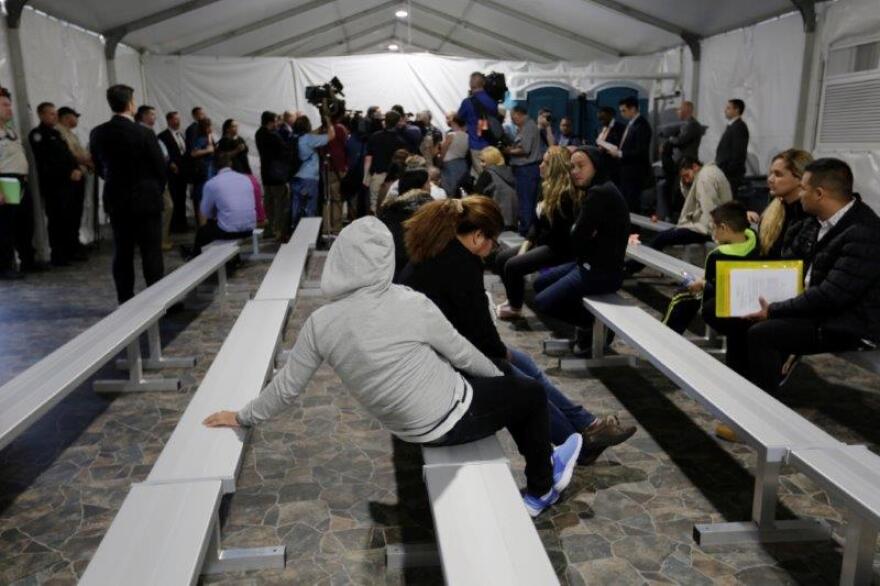By Travis Bubenik, Courthouse News
Advocates from groups representing immigration judges and lawyers painted a dire portrait Wednesday of the nation’s overwhelmed immigration courts, describing to House lawmakers a system plagued by political interference where due process violations are routine.
The problems, the advocates testified to a House Judiciary subcommittee, range from an ever-growing backlog of more than 1 million undecided immigration cases and immigrants struggling to access attorneys, to overworked judges fearful of losing their jobs if they don’t close cases at rates prescribed by the Trump administration’s Justice Department.
“Through one policy announcement or another, the DOJ has transformed the court into [a] law enforcement assembly line,” Ashley Tabaddor, president of the National Association of Immigration Judges, told lawmakers.
Tabaddor, who is also a sitting immigration judge in Los Angeles, accused the Trump administration of prioritizing “speed over substance” in setting what she called unrealistic quotas on judges to clear at least 700 cases per year.
“Judges are feeling the pressure,” she testified. “The level of hostility toward us, the insulting and offensive way by which we are being treated…the micromanagement of our daily dockets, it’s frankly unprecedented.”
Tabaddor’s organization and groups like it, including the American Bar Association, have repeatedly pushed for Congress to create an independent judicial system for immigration cases.
Such a move, the groups argue, would address the “inherent conflict of interest” of the nation’s immigration courts being housed within the Justice Department, a law enforcement agency, where judges are subject to the changing political whims and enforcement priorities of different administrations.
Jeremy McKinney, a North Carolina attorney and advocate with the American Immigration Lawyers Association, told the Democrat-controlled committee that both President Donald Trump and former President Barack Obama used the “structural infirmity” of immigration courts to further political agendas.
“Both administrations have botched this up,” he said.
Political leaders across administrations have used the DOJ’s power to shuffle judges’ dockets to prioritize certain types of immigration cases, McKinney said.
Critics of the practice, including McKinney, say it makes immigration courts less efficient, as previously scheduled court proceedings get disrupted and delayed to make way for the prioritized cases.
Republicans at Wednesday’s hearing challenged the notion that the system itself is to blame for the growing backlog of open immigration cases.
“Not one of you mentioned the cause of why we’re here, and that is people breaking our law and crossing our border,” said Representative Ken Buck, R.-Colo., addressing the critics on the hearing panel. “The truth is the backlog is caused by more illegal immigrants coming into this country and ending up in your court.”
McKinney disputed that characterization in an interview after the hearing, pointing to the fact that the number of undecided immigration cases has steadily grown in recent years, even during a historic drop in border apprehensions in 2017. Border arrests later shot back up, reaching historic highs in 2019 amid an influx of Central American families and children seeking asylum in the U.S.
“This backlog started under the Obama administration and then grew exponentially under the Trump administration,” McKinney said.
A policy advocate with the Center for Immigration Studies, a group that has praised the Trump administration’s more restrictive immigration policies, testified Wednesday that immigration courts need an influx of resources rather than a broad structural overhaul.
“I’m talking about more immigration judges, more staff, more judicial law clerks, all around,” said Andrew Arthur, a former immigration judge and U.S. official.
“A future Congress with the power of the purse could easily starve an immigration court” if the system were made independent, Arthur argued.
Tabaddor, speaking in her capacity as head of the judges’ union, said in an interview that her criticism stems from a concern that immigrants are not receiving a fair opportunity to have their cases heard, even if some of them ultimately don’t qualify for protection.
“It’s this preconceived notion that individuals that are seeking to gain access to the process are somehow not deserving of it,” she said. “If people are being deprived of access, either explicitly or effectively through the obstacles that are thrown their way, then that’s the violation.”

